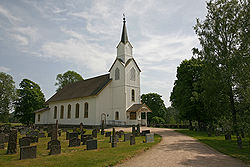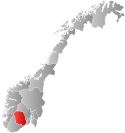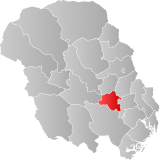Lunde, Telemark
Lunde Municipality
Lunde herred | |
|---|---|
 View of the local church | |
 Telemark within Norway | |
 Lunde within Telemark | |
| Coordinates: 59°17′54″N 9°06′10″E / 59.29832°N 9.10268°E | |
| Country | Norway |
| County | Telemark |
| District | Midt-Telemark |
| Established | 1 Jan 1867 |
| • Preceded by | Bø Municipality |
| Disestablished | 1 Jan 1964 |
| • Succeeded by | Nome Municipality |
| Administrative centre | Bjervamoen |
| Area (upon dissolution) | |
• Total | 275 km2 (106 sq mi) |
| Population (1964) | |
• Total | 3,080 |
| • Density | 11/km2 (29/sq mi) |
| Demonym | Lundhering[1] |
| Time zone | UTC+01:00 (CET) |
| • Summer (DST) | UTC+02:00 (CEST) |
| ISO 3166 code | NO-0820[2] |
Lunde is a former municipality in Telemark county, Norway. The 275-square-kilometre (106 sq mi) municipality existed from 1867 until its dissolution in 1964. The area is now part of Nome Municipality. It was part of the traditional district of Midt-Telemark. The administrative centre was the village of Bjervamoen.[3]
Lunde was the production site of the Troll automobile. It is also known as the birthplace of ski racer Atle Skårdal and jazz singer Torun Eriksen.
History
[edit]The parish of Lunde was established as a municipality on 1 January 1867 when the large Bø Municipality was divided. The northern district of Bø remained as Bø municipality with 2,633 residents and the southern district became Lunde municipality with a population of 2,257 people. During the 1960s, there were many municipal mergers across Norway due to the work of the Schei Committee. On 1 January 1964 Lunde Municipality (population: 3,080) was merged with most of the neighboring Holla Municipality (population: 4,093) to form the new municipality Nome Municipality.[4]
Name
[edit]The municipality (originally the parish) is named after the old Lunde farm (Old Norse: Lundr) since the first Lunde Church was built there. The name is identical to the word lundr which means "grove" or a "clump of trees". The present form Lunde is derived from the singular dative case of the word, lundi.[5]
Government
[edit]While it existed, this municipality was responsible for primary education (through 10th grade), outpatient health services, senior citizen services, unemployment, social services, zoning, economic development, and municipal roads. During its existence, this municipality was governed by a municipal council of directly elected representatives. The mayor was indirectly elected by a vote of the municipal council.[6]
Municipal council
[edit]The municipal council (Herredsstyre) of Lunde was made up of 25 representatives that were elected to four year terms. The tables below show the historical composition of the council by political party.
| Party name (in Norwegian) | Number of representatives | |
|---|---|---|
| Labour Party (Arbeiderpartiet) | 12 | |
| Christian Democratic Party (Kristelig Folkeparti) | 3 | |
| Centre Party (Senterpartiet) | 5 | |
| Liberal Party (Venstre) | 5 | |
| Total number of members: | 25 | |
| Party name (in Norwegian) | Number of representatives | |
|---|---|---|
| Labour Party (Arbeiderpartiet) | 13 | |
| Christian Democratic Party (Kristelig Folkeparti) | 3 | |
| Farmers' Party (Bondepartiet) | 5 | |
| Liberal Party (Venstre) | 4 | |
| Total number of members: | 25 | |
| Party name (in Norwegian) | Number of representatives | |
|---|---|---|
| Labour Party (Arbeiderpartiet) | 12 | |
| Christian Democratic Party (Kristelig Folkeparti) | 3 | |
| Farmers' Party (Bondepartiet) | 4 | |
| Liberal Party (Venstre) | 5 | |
| Total number of members: | 24 | |
| Party name (in Norwegian) | Number of representatives | |
|---|---|---|
| Labour Party (Arbeiderpartiet) | 12 | |
| Christian Democratic Party (Kristelig Folkeparti) | 4 | |
| Farmers' Party (Bondepartiet) | 3 | |
| Liberal Party (Venstre) | 5 | |
| Total number of members: | 24 | |
| Party name (in Norwegian) | Number of representatives | |
|---|---|---|
| Labour Party (Arbeiderpartiet) | 13 | |
| Christian Democratic Party (Kristelig Folkeparti) | 4 | |
| Farmers' Party (Bondepartiet) | 3 | |
| Liberal Party (Venstre) | 3 | |
| List of workers, fishermen, and small farmholders (Arbeidere, fiskere, småbrukere liste) | 1 | |
| Total number of members: | 24 | |
| Party name (in Norwegian) | Number of representatives | |
|---|---|---|
| Labour Party (Arbeiderpartiet) | 11 | |
| Farmers' Party (Bondepartiet) | 7 | |
| Liberal Party (Venstre) | 3 | |
| Local List(s) (Lokale lister) | 3 | |
| Total number of members: | 24 | |
| Note: Due to the German occupation of Norway during World War II, no elections were held for new municipal councils until after the war ended in 1945. | ||
See also
[edit]References
[edit]- ^ "Navn på steder og personer: Innbyggjarnamn" (in Norwegian). Språkrådet.
- ^ Bolstad, Erik; Thorsnæs, Geir, eds. (9 January 2024). "Kommunenummer". Store norske leksikon (in Norwegian). Foreningen Store norske leksikon.
- ^ Thorsnæs, Geir, ed. (8 June 2020). "Lunde (Telemark)". Store norske leksikon (in Norwegian). Kunnskapsforlaget. Retrieved 3 September 2023.
- ^ Jukvam, Dag (1999). "Historisk oversikt over endringer i kommune- og fylkesinndelingen" (PDF) (in Norwegian). Statistisk sentralbyrå. ISBN 9788253746845.
- ^ Rygh, Oluf (1914). Norske gaardnavne: Bratsbergs amt (in Norwegian) (7 ed.). Kristiania, Norge: W. C. Fabritius & sønners bogtrikkeri. pp. 182 and 187.
- ^ Hansen, Tore; Vabo, Signy Irene, eds. (20 September 2022). "kommunestyre". Store norske leksikon (in Norwegian). Kunnskapsforlaget. Retrieved 3 August 2023.
- ^ "Kommunevalgene og Ordførervalgene 1959" (PDF) (in Norwegian). Oslo, Norge: Statistisk sentralbyrå. 1960.
- ^ "Kommunevalgene og Ordførervalgene 1955" (PDF) (in Norwegian). Oslo, Norge: Statistisk sentralbyrå. 1957.
- ^ "Kommunevalgene og Ordførervalgene 1951" (PDF) (in Norwegian). Oslo: Statistisk sentralbyrå. 1952.
- ^ "Kommunevalgene og Ordførervalgene 1947" (PDF) (in Norwegian). Oslo: Statistisk sentralbyrå. 1948.
- ^ "Kommunevalgene og Ordførervalgene 1945" (PDF) (in Norwegian). Oslo: Statistisk sentralbyrå. 1947.
- ^ "Kommunevalgene og Ordførervalgene 1937" (PDF) (in Norwegian). Oslo: Statistisk sentralbyrå. 1938.

